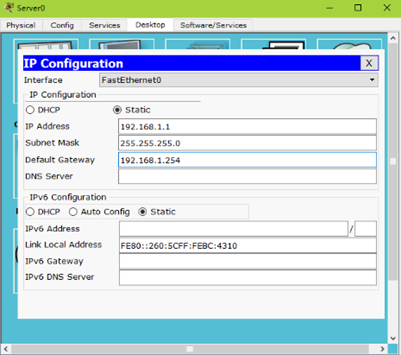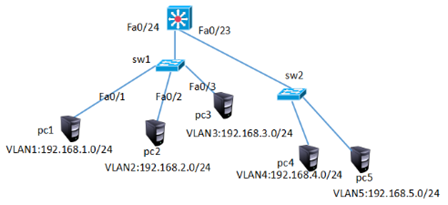一、三层交换vlan间通信
目标:
VLAN实现了广播域的隔离,同时也将VLAN间的通信隔离了。三层交换技术使得VLAN间可以通信。
- 通过三层交换实现VLAN间通信
方案:
为了解决了传统路由器低速、复杂所造成的网络瓶颈问题,引入了三层交换技术。它根据实际应用时的情况,灵活地在网络第二层或者第三层进行网络分段。具有三层交换功能的设备是一个带有第三层路由功能的第二层交换机。
简单地说,三层交换技术就是:二层交换技术+三层转发技术。
三层交换实现的拓扑如下图所示:

步骤:
步骤一:在连接PC的交换机上划分3个VLAN,并按图-1把PC机加入相应VLAN
tarenasw-3L (config)#vlan 2 //vlan1是默认VLAN,不需创建
tarenasw-3L (config-vlan)#vlan 3
tarenasw-3L (config-vlan)#exit
tarenasw-3L (config)#interface f0/1
tarenasw-3L (config-if)#switchport mode access
tarenasw-3L (config-if)#switchport access vlan 1
tarenasw-3L (config-if)#interface f0/2
tarenasw-3L (config-if)#switchport mode access
tarenasw-3L (config-if)#switchport access vlan 2
tarenasw-3L (config-if)#interface f0/3
tarenasw-3L (config-if)#switchport mode access
tarenasw-3L (config-if)#switchport access vlan 3
步骤二:查看划分完的VLAN信息
VLAN1是默认VLAN,不需单独创建,也不能改名。所有端口默认都在VLAN1中。
tarenasw-2L#show vlan
VLAN Name Status Ports
---- ----------------------- --------- ---------------------
1 default active Fa0/1, Fa0/4, Fa0/5, Fa0/6
Fa0/7, Fa0/8, Fa0/9, Fa0/10
Fa0/11, Fa0/12, Fa0/13, Fa0/14
Fa0/15, Fa0/16, Fa0/17, Fa0/18
Fa0/19, Fa0/20, Fa0/21, Fa0/22
Fa0/23, Fa0/24, Gig1/1, Gig1/2
2 vlan0002 active Fa0/2
3 vlan0003 active Fa0/3
步骤三:为vlan1、vlan2、vlan3分别设置管理IP并开启三层交换机路由功能
tarenasw-3L #enable
tarenasw-3L #configure terminal
tarenasw-3L (config)#ip routing //开启三层交换机路由功能
tarenasw-3L (config)#interface vlan 1
tarenasw-3L (config-if)#ip address 192.168.1.254 255.255.255.0
tarenasw-3L (config-if)#no shutdown
tarenasw-3L (config-if)#exit
tarenasw-3L (config)#interface vlan 2
tarenasw-3L (config-if)#ip address 192.168.2.254 255.255.255.0
tarenasw-3L (config-if)#no shutdown
tarenasw-3L (config-if)#exit
tarenasw-3L (config)#interface vlan 3
tarenasw-3L (config-if)#ip address 192.168.3.254 255.255.255.0
tarenasw-3L (config-if)#no shutdown
步骤四:给客户端配置IP地址并测试网络连通性如下图所示


在PC1三上测试网络连通性
PC1>ping 192.168.3.1
Pinging 192.168.3.1 with 32 bytes of data:
Reply from 192.168.3.1: bytes=32 time=11ms TTL=128
Reply from 192.168.3.1: bytes=32 time=1ms TTL=128
Reply from 192.168.3.1: bytes=32 time=1ms TTL=128
Reply from 192.168.3.1: bytes=32 time=4ms TTL=128
Ping statistics for 192.168.3.1:
Packets: Sent = 4, Received = 4, Lost = 0 (0% loss),
Approximate round trip times in milli-seconds:
Minimum = 1ms, Maximum = 11ms, Average = 4ms
二、多交换机vlan间通信
目标:
三层交换机将接入层交换机汇聚到一起后还需实现了多交换机间不同VLAN的通信。
方案:
三层交换机连接其他交换机的链路需配置为中继链路,三层交换机接口配置trunk模式需先封装,sw1规划vlan1、vlan2、vlan3,Sw2规划vlan4、vlan5并按图-4给相应vlan配置对应网段的IP。
网络的拓扑结构如下图所示:

步骤:
步骤一:配置三层交换机
1)三层交换机创建vlan并配置vlan的虚端口IP并开启路由功能
Switch>enable
Switch#configure terminal
Switch(config)#vlan 2
Switch(config-vlan)#vlan 3
Switch(config-vlan)#vlan 4
Switch(config-vlan)#vlan 5
Switch(config)#interface vlan 1
Switch(config-if)#ip address 192.168.1.254 255.255.255.0
Switch(config-if)#no shutdown
Switch(config)#interface vlan 2
Switch(config-if)#ip address 192.168.2.254 255.255.255.0
Switch(config-if)#no shutdown
Switch(config)#interface vlan 3
Switch(config-if)#ip address 192.168.3.254 255.255.255.0
Switch(config-if)#no shutdown
Switch(config)#interface vlan 4
Switch(config-if)#ip address 192.168.4.254 255.255.255.0
Switch(config-if)#no shutdown
Switch(config)#interface vlan 5
Switch(config-if)#ip address 192.168.5.254 255.255.255.0
Switch(config-if)#no shutdown
Switch(config)#ip routing //开启路由功能
2)三层交换的Fa0/23、Fa0/24设置为中继链路模式
Switch(config)#interface range f0/23-24
Switch (config-if-range)#switchport trunk encapsulation dot1q
Switch (config-if-range)#switchport mode trunk
步骤二:配置二层交换机
1)Sw1创建vlan2、 vlan3并将端口加入vlan
Sw1(config)#vlan 2
Sw1(config-vlan)#vlan 3
Sw1(config)#interface fastEthernet 0/2
Sw1(config-if)#switchport access vlan 2
Sw1(config)#interface fastEthernet 0/3
Sw1(config-if)#switchport access vlan 3
Sw1(config)#interface fastEthernet 0/5
Sw1(config-if)#switchport mode trunk //连接三层交换机的接口配置为trunk模式
2)Sw2创建vlan4、 vlan5并将端口加入vlan
Sw2(config)#vlan 4
Sw2(config-vlan)#vlan 5
Sw2(config)#interface fastEthernet 0/1
Sw2(config-if)#switchport access vlan 4
Sw2(config)#interface f0/2
Sw2(config-if)#switchport access vlan 5
步骤三:按上图配置IP并测试网络的连通性
PC>ipconfig
FastEthernet0 Connection:(default port)
Link-local IPv6 Address.........: FE80::2D0:D3FF:FE2E:5D25
IP Address......................: 192.168.1.1
Subnet Mask.....................: 255.255.255.0
Default Gateway.................: 192.168.1.254
PC>ping 192.168.4.1
Pinging 192.168.4.1 with 32 bytes of data:
Reply from 192.168.4.1: bytes=32 time=0ms TTL=127
Reply from 192.168.4.1: bytes=32 time=0ms TTL=127
Reply from 192.168.4.1: bytes=32 time=0ms TTL=127
Reply from 192.168.4.1: bytes=32 time=0ms TTL=127
Ping statistics for 192.168.4.1:
Packets: Sent = 4, Received = 3, Lost = 1 (25% loss),
Approximate round trip times in milli-seconds:
Minimum = 0ms, Maximum = 0ms, Average = 0ms
PC>ping 192.168.5.1
Pinging 192.168.5.1 with 32 bytes of data:
Reply from 192.168.5.1: bytes=32 time=0ms TTL=127
Reply from 192.168.5.1: bytes=32 time=0ms TTL=127
Reply from 192.168.5.1: bytes=32 time=0ms TTL=127
Reply from 192.168.5.1: bytes=32 time=0ms TTL=127
Ping statistics for 192.168.5.1:
Packets: Sent = 4, Received = 3, Lost = 1 (25% loss),
Approximate round trip times in milli-seconds:
Minimum = 0ms, Maximum = 0ms, Average = 0ms
三、三层交换配置路由
目标:
三层交换机实现了VLAN间互通后,还要与其他网络进行通信,这样就需要有相关的路由机制。
- 交换接口配置为三层接口实现路由间通信
方案:
三层交换机既然具有三层功能,也就可以实现与路由器相似的配置。既可以把交换接口配置为三层接口,也可以在其上配置静态、动态路由。通过对三层交换机的路由配置,实现VLAN与其他网络的互通。
网络的拓扑结构如下图所示:

步骤:
步骤一:多交换机vlan通信与案例2完全一致,不再赘述
步骤二:将三层交换的Fa0/6口配置为三层路由端口,并配置IP地址
三层交换机的物理端口默认是二层端口,只具有二层特性,不能配置IP地址。把二层端口配置为三层端口后,该端口就具备路由功能了,可以配置IP地址,但同时也就关闭了其二层特性,比如不能把三层端口加入VLAN。
二层端口(交换机上的端口默认都是二层端口)默认是激活状态,那些没有使用到的端口为了安全应该手工将其禁用(shutdown);而 三层端口(路由器上的端口或是三层交换机上被配置成路由端口的端口)默认是禁用状态,在使用之前务必要将其激活(no shutdown)。
Switch(config)#interface f0/6
Switch(config-if)#no switchport
Switch(config-if)#ip address 192.168.6.1 255.255.255.0
Switch(config-if)#no shutdown
步骤三:配置路由器的端口IP地址
Switch(config)#interface f0/0
Switch(config-if)#ip address 192.168.6.2 255.255.255.0
Switch(config-if)#no shutdown
Switch(config-if)#interface f0/1
Switch(config-if)#ip address 192.168.7.254 255.255.255.0
Switch(config-if)#no shutdown
步骤四:在三层交换机上配置静态路由,以便VLAN内主机可以与外界网络互联
Switch(config)#ip route 192.168.7.0 255.255.255.0 192.168.6.2
Switch(config)#exit
Switch#show ip route
Codes: C - connected, S - static, I - IGRP, R - RIP, M - mobile, B - BGP
D - EIGRP, EX - EIGRP external, O - OSPF, IA - OSPF inter area
N1 - OSPF NSSA external type 1, N2 - OSPF NSSA external type 2
E1 - OSPF external type 1, E2 - OSPF external type 2, E - EGP
i - IS-IS, L1 - IS-IS level-1, L2 - IS-IS level-2, ia - IS-IS inter area
* - candidate default, U - per-user static route, o - ODR
P - periodic downloaded static route
Gateway of last resort is not set
C 192.168.1.0/24 is directly connected, Vlan1
C 192.168.2.0/24 is directly connected, Vlan2
C 192.168.3.0/24 is directly connected, Vlan3
C 192.168.4.0/24 is directly connected, Vlan4
C 192.168.5.0/24 is directly connected, Vlan5
C 192.168.6.0/24 is directly connected, FastEthernet0/6
S 192.168.7.0/24 [1/0] via 192.168.6.2
步骤五:在路由器上配置到达三个VLAN网络的静路由
tarena-rouer(config)#ip route 192.168.1.0 255.255.255.0 192.168.6.1
tarena-rouer(config)#ip route 192.168.2.0 255.255.255.0 192.168.6.1
tarena-rouer(config)#ip route 192.168.3.0 255.255.255.0 192.168.6.1
tarena-rouer(config)#ip route 192.168.4.0 255.255.255.0 192.168.6.1
tarena-rouer(config)#ip route 192.168.5.0 255.255.255.0 192.168.6.1
tarena-rouer(config)#exit
tarena-rouer#show ip route
Codes: C - connected, S - static, I - IGRP, R - RIP, M - mobile, B - BGP
D - EIGRP, EX - EIGRP external, O - OSPF, IA - OSPF inter area
N1 - OSPF NSSA external type 1, N2 - OSPF NSSA external type 2
E1 - OSPF external type 1, E2 - OSPF external type 2, E - EGP
i - IS-IS, L1 - IS-IS level-1, L2 - IS-IS level-2, ia - IS-IS inter area
* - candidate default, U - per-user static route, o - ODR
P - periodic downloaded static route
Gateway of last resort is not set
S 192.168.1.0/24 [1/0] via 192.168.6.1
S 192.168.2.0/24 [1/0] via 192.168.6.1
S 192.168.3.0/24 [1/0] via 192.168.6.1
S 192.168.4.0/24 [1/0] via 192.168.6.1
S 192.168.5.0/24 [1/0] via 192.168.6.1
C 192.168.6.0/24 is directly connected, FastEthernet0/0
C 192.168.7.0/24 is directly connected, FastEthernet0/1
tarena-rouer#
步骤六:在PC上测试与VLAN的连通性
PC>ipconfig
FastEthernet0 Connection:(default port)
Link-local IPv6 Address.........: FE80::2E0:8FFF:FE14:BB43
IP Address......................: 192.168.7.1
Subnet Mask.....................: 255.255.255.0
Default Gateway.................: 192.168.7.254
SERVER>ping 192.168.1.1
Pinging 192.168.1.1 with 32 bytes of data:
Request timed out.
Reply from 192.168.1.1: bytes=32 time=0ms TTL=126
Reply from 192.168.1.1: bytes=32 time=0ms TTL=126
Reply from 192.168.1.1: bytes=32 time=1ms TTL=126
Ping statistics for 192.168.1.1:
Packets: Sent = 4, Received = 3, Lost = 1 (25% loss),
Approximate round trip times in milli-seconds:
Minimum = 0ms, Maximum = 1ms, Average = 0ms
SERVER>ping 192.168.2.10
Pinging 192.168.2.1 with 32 bytes of data:
Reply from 192.168.2.1: bytes=32 time=0ms TTL=126
Reply from 192.168.2.1: bytes=32 time=0ms TTL=126
Reply from 192.168.2.1: bytes=32 time=0ms TTL=126
Reply from 192.168.2.1: bytes=32 time=0ms TTL=126
Ping statistics for 192.168.2.1:
Packets: Sent = 4, Received = 4, Lost = 0 (0% loss),
Approximate round trip times in milli-seconds:
Minimum = 0ms, Maximum = 0ms, Average = 0ms
SERVER>ping 192.168.3.1
Pinging 192.168.3.1 with 32 bytes of data:
Reply from 192.168.3.1: bytes=32 time=1ms TTL=126
Reply from 192.168.3.1: bytes=32 time=0ms TTL=126
Reply from 192.168.3.1: bytes=32 time=0ms TTL=126
Reply from 192.168.3.1: bytes=32 time=0ms TTL=126
Ping statistics for 192.168.3.1:
Packets: Sent = 4, Received = 4, Lost = 0 (0% loss),
Approximate round trip times in milli-seconds:
Minimum = 0ms, Maximum = 1ms, Average = 0ms